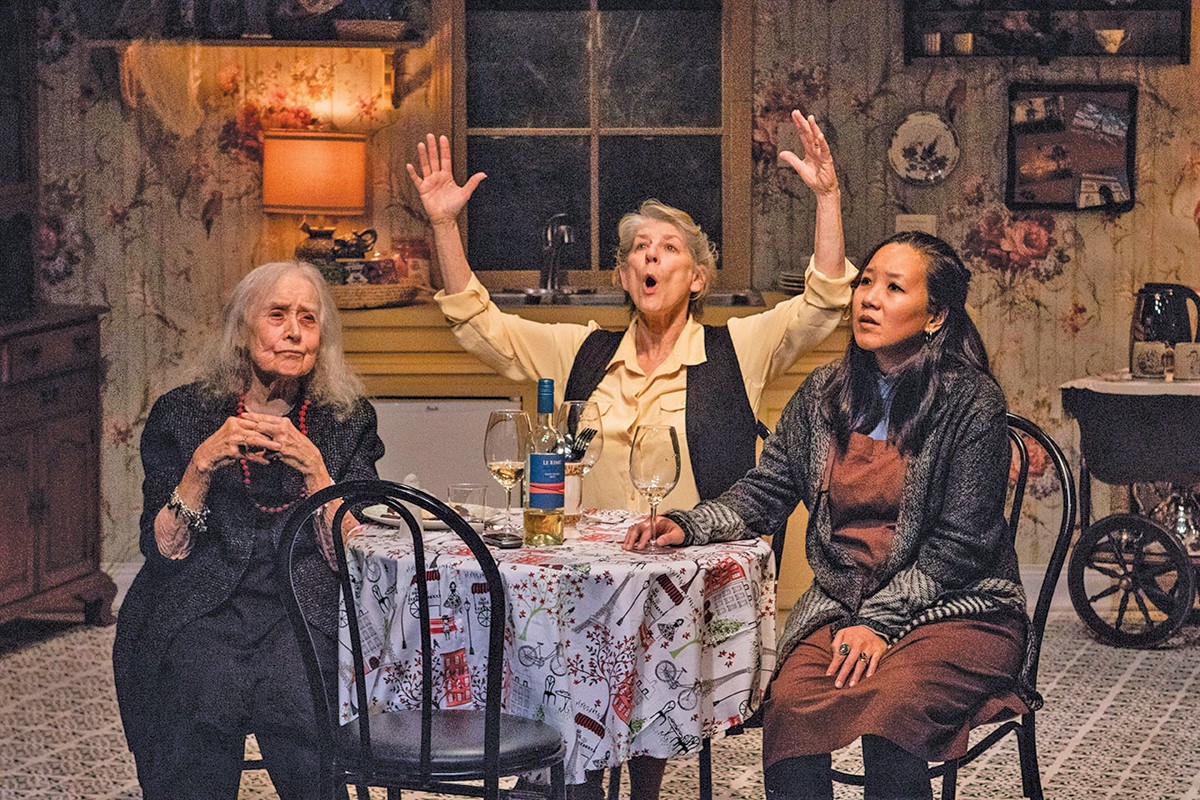If there's one takeaway from the Brett Kavanaugh hearing, when he was confronted by a woman for his past behavior, it is this: Women are always held accountable for their actions, men rarely are. This lack of accountability is a particular luxury afforded to men of privilege, such as Kavanaugh, who are free to behave like pouty, hyper-emotional, spoiled children in public and still be granted a seat on the Supreme Court. If you need another reason to vote on Nov. 6, there it is.
And if you need a reason to see John by Annie Baker at Dobama Theatre, look no farther than the women who comprise three-fourths of the cast. These women are the most compelling characters in this long, languorous drama set in a cutesy, Victorian doll infested bed-and-breakfast in Gettysburg, Pennsylvania. This is where Civil War buff Elias and Jenny show up for a stop on their way home from visiting her parents in Ohio.
But this is not your usual romantic duo, and the fault lines of their relationship show up very quickly. Jenny (a splendid Kat Shy) is Jenny Chung, a woman who is girlishly manipulative, prone to cramps, and has long imagined that her dolls were angrily judging her. Elias, as performed by the relentlessly downbeat Luke Wehner, is a little confrontational and a lot touchy. When Jenny glances at him sideways for eating too loudly, he leaps immediately to accusing his Asian girlfriend of anti-Semitism. This is clearly a relationship heading towards the rocks.
And it's possible the house itself isn't helping. We learn that during the Civil War, it was used as a hospital where amputated limbs were tossed out the windows, eventually piling up and blocking the windows. Even now, there is a cloying closeness to the house that is almost palpable. Clearly, there are mysterious forces at work in this space, lovingly rendered by scenic designer Cameron Casey Michalak and lighting designer Marcus Dana. At odd moments the lights go on and off and the player piano pounds out happy, up-tempo tunes.
But none of this deters B&B owner Mertis, a sweet older lady who apparently can find a silver lining in anything. She putters around, tending to her guests and disappearing into a back room where she is supposedly caring for her sick husband. In this role, Catherine Albers is a wonder, modulating her voice and delivery from high-pitched enthusiasm to gravely concern when, at different times, she asks both young people if they ever felt watched as a child, and if that watcher would take care of them.
Speaking of watchers, in the second act when Elias is off visiting Civil War battle sites, Mertis and Jenny are visited by Mertis's gal pal Genevieve, who is quite elderly and blind. But as played by the remarkable Dorothy Silver, Genevieve can see through to the truth when others can't. Indeed, she agrees with Jenny's paranoia about the angry dolls, declaring that of course dolls are angry, having been consigned to that single bland facial expression and being forced to wear itchy dresses. And when Genevieve describes the presence of her dead husband inside her body, it feels like a terminally creepy version of the pop standard "I've Got You Under my Skin."
The scenes involving Silver and Albers are enigmatic and absorbing, nuanced in ways that most productions can only dream about. And Silver tops it off with a surprise curtain speech about the seven stages of Genevieve's mental disorders. It is a treasure.
Each act is punctuated by the opening and closing of a long sweep of red curtain. Mertis is charged with this task, which she does by hand, and that simple gesture resonates in a couple different ways. On one hand, it is a nod to the staging of theatricals of the past, when the opening of a large and lush curtain signaled the beginning of a theatrical adventure.
But in this play, it symbolizes something more, a visual metaphor for lives that reveal as much as they hide. For example, Elias has been hurt in the past by Jenny, and he apparently seeks retribution in small ways. He isn't sure whether to stay in the relationship or move on. It's a universal dilemma that faces most of us during our lives. And we're never certain whether the best move is to open the curtain and reveal our true feelings, or pull it closed.
As the play enters its fourth hour (there are two intermissions), one wonders if all this could be handled in a less time-consuming manner. But under the sensitive direction of Nathan Motta, John glistens most brightly in the silences carved out by these talented actors.
So settle in. You're in for a highly detailed, evocative and elusive journey with John.











